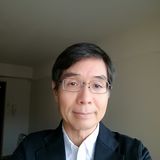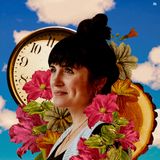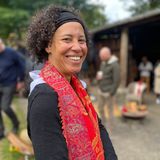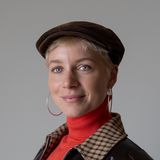Environment, social justice, economy – it’s becoming clear that our dominant systems are broken. In her 3-month DCFA Fellowship, Singapore-based urbanist Sarah Ichioka dives deeper into the possibilities for systemic change. What promising alternative systems and regenerative practices are already emerging around the world? And who are taking the first steps towards these essential changes?
In the third part of D esigning Cities for All: RE-generation ’s series Regenerative Design with DCFA Fellow Sarah Ichioka , we look at the concept of time together with designers, storytellers, creatives, experts and others. We dive into various perspectives of time beyond the Western notions. How does the perception of time affect how we design and inhabit places?





About the DCFA Fellow
Sarah Mineko Ichioka is an urbanist, strategist, curator and writer. She leads Desire Lines , a strategic consultancy for environmental, cultural, and social-impact initiatives and organizations. Her latest book, Flourish: Design Paradigms for Our Planetary Emergency , co-authored with Michael Pawlyn, proposes a bold set of regenerative design principles for addressing our compound environmental and social crises. In previous roles Sarah has explored the intersections of cities, society and ecology within leading international institutions of culture, policy and research, including as Director of The Architecture Foundation (UK) and Co-Director of the London Festival of Architecture (both from 2008- 2014).
Watch Sarah’s introduction of her DCFA Fellowship on Regenerative Design below!
About the Speakers
Tatsuyoshi Saijo received his Ph.D. in Economics from the University of Minnesota in 1985 in the field of institutional design theory. He taught at Ohio State, UC Santa Barbara, Tsukuba, Osaka, Hitotsubashi, and Kochitech. Motivated by the belief that it is our myopia that leads human beings to continue experiencing various future failures which jeopardize our survival, Saijo advocates Future Design, the design of social systems to prevent future failures. The concept involves backcasting from the future by mentally traveling forward in time to the year 2050, for example, and envisioning the world as it will be in 2050 to give advice for the present.
Ella Saltmarshe is the co-founder of The Long Time Project, which focuses on galvanising public imagination and collective action to help us all be good ancestors. She’s the host of the Long Time Academy Podcast, which was recently awarded the best independent podcast of the year by The Radio Academy, and the Visionary Leadership Award at the International Women’s Podcast Awards. A specialist in narrative, culture and systems change, she’s also the co-founder of the Reset Narratives Community. She works with governments, funders, civil society and artists to harness the power of culture to build better futures.
Jeroen Timmer is a designer and tinkerer who focusses on sustainable design, experiments and observations. He enjoys repairing, healing, thinking about todays challenges and asking questions by tweaking ‘reality’. Last year at Dutch Design Week, he presented his project Shinetime, a new time measuring device that shows how much light is available each day. As humans we are energised by the sun. Therefore it is important for our wellbeing to know when sunlight is available. By doing so we make best use of every sparkle of light. Unlike our current time system, Shinetime is dynamic and moves along with the seasons.
Jessica Wawoe is a mother, a connector, a natural farming enthusiast, a transition guide and the founder of the Tribal Wisdom Foundation . She believes that re-rooting with our own indigenousness is one of the keys to the future we dream of, and that that future is now. She supports traditional knowledge holders from The Netherlands and all over the world to share their teachings, stories and practices through online and live ‘sharing circles’, based on oral tradition and deep listening. On the side, Jessica works for human-centered Leadership Development agency Dutch Leaders as a trainer and (team) coach and with whom she coordinates the Meaningful Leadership Community, an annual programme for business leaders and young professionals exploring and acting on their sense of purpose . At the core of her ‘soul system’ is her family, which lead her to move back to The Netherlands after 15 years abroad, living in different countries, continents and cultures.
About Designing Cities for All: RE-generation
Over the past two years of Designing Cities for All (DCFA), we’ve learned about exclusion by design and the (re)design of inclusive cities. Along the journey, a certain question kept popping up: what exactly does ‘for all’ entail? After focusing mostly on the ‘who’ over the past two years, DCFA is rebooting as Designing Cities for All: RE-generation . This way around, the series is also incorporating the ‘what’ by looking through the fresh lens of regenerative design . This emerging field might very well be a promising answer to the challenges of our time, as it focuses on the design of products, services, systems and processes that lead to both social and ecological recovery and that keep the systems healthy.

We are supporters of the philosopher Roman Krznaric’s work on “future generations”. Developing feeling and instincts for being “Good ancestors” (the title of his recent book), thinking long-term in a short-term world, is his admirable ambition. >>

What do photographs of ancient organisms, blocks of ice in the centre of London and the blockbuster Black Panther have to do with the future of humanity? Ella Saltmarshe and Beatrice Pembroke explain. >>

Alice Smit, art curator and researcher in the field of art and ecology, delves into artistic practices that tune into deep time and non-human time zones. She discusses art and aesthetic knowledge as particularly well suited for experimentation with new stories and sensibilities about our place in time. >>











